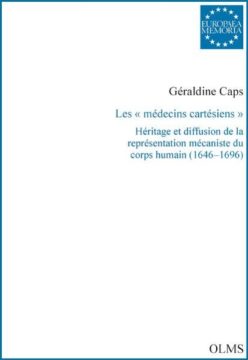Durant le second XVIIe siècle, les ‚ médecins cartésiens ‚ diffusent la représentation mécaniste du corps humain inhérente au système de René Descartes. Il s’agit ici de retracer et d’étudier l’héritage complexe de cette thèse cardinale de l’œuvre de Descartes en analysant les vecteurs, les enjeux et les stratégies interdisciplinaires de diffusion, en mettant en évidence la pluralité de cartésianismes et en s’interrogeant sur les raisons d’être des multiples recompositions dont la pensée de Descartes fait l’objet. En France, l’institutionnalisation progressive de cette nouvelle idée que constitue la représentation mécaniste du corps conduit à invalider la tradition médicale galénico-scolastique et participe de l’autonomisation de la science médicale en la dotant d’une nouvelle rationalité hypothético-déductive et anti-finaliste.
***
Während der zweiten Hälfte des 17. Jahrhunderts verbreiten die „kartesianischen Ärzte“ das mechanistische Bild des menschlichen Körpers, das mit dem System von René Descartes aufs Engste verbunden ist. Das Anliegen dieser Arbeit ist es, das komplexe Erbe dieser Hauptthese des Werkes von Descartes nachzuvollziehen und zu erforschen, indem die Träger, die Unternehmungen und die interdisziplinären Strategien der Verbreitung analysiert werden. Dabei wird zugleich die Vielfalt der Spielarten des Kartesianismus deutlich gemacht und die Daseinsberechtigung der zahlreichen Umgestaltungen, die das Gedankengut Descartes’ erfahren hat, wird untersucht. In Frankreich führt die zunehmende Institutionalisierung dieser neuen Idee des mechanistischen Bildes vom Körper dazu, dass die galenisch-scholastische Medizin-Tradition ausgedient hat. Das neue Bild vom Körper wirkt an der Verselbständigung der Medizinwissenschaft mit, indem es ihr eine neue hypothetisch-deduktive und antifinalistische Rationalität verleiht.
**
During the second half of the 17th century, “Cartesian doctors” promulgated a mechanistic view of the human body which was closely linked with Descartes’ system. This study seeks to trace and investigate the complex heritage of this central theory in the work of Descartes by analysing the bearers, enterprises and interdisciplinary strategies which propagated it. At the same time the study examines the range of variations on Cartesianism and the ways in which the numerous transformations of the ideas of Descartes were justified. In France, the increasing institutionalisation of this new idea of a mechanistic view of the body led to the Galenic-scholastic medical tradition falling into disuse. The new image of the body affected the self-perception of medical science, providing it with a new hypothetical-deductive and anti-finalistic rationality.
- Veröffentlicht am Mittwoch 20. November 2024 von Olms, Georg
- ISBN: 9783487143118
- 790 Seiten
- Genre: Aufklärung, Hardcover, Philosophie, Renaissance, Softcover
